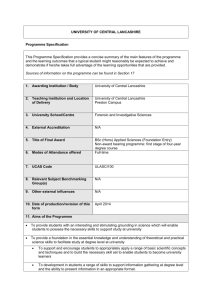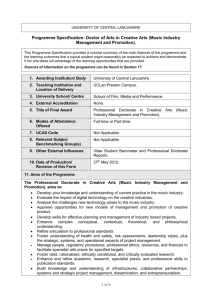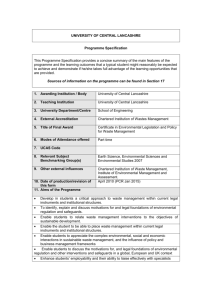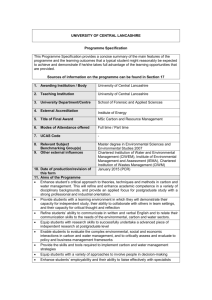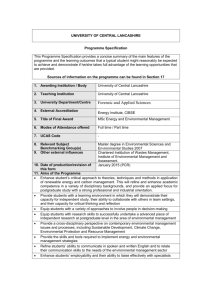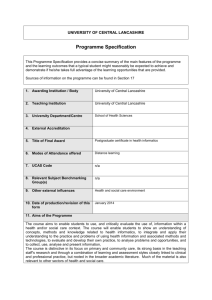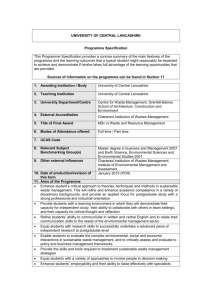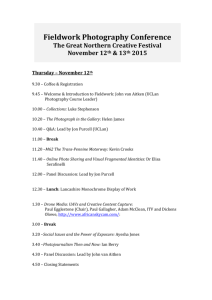PGC in Music Industry Management and Promotion (Sept 2012)
advertisement
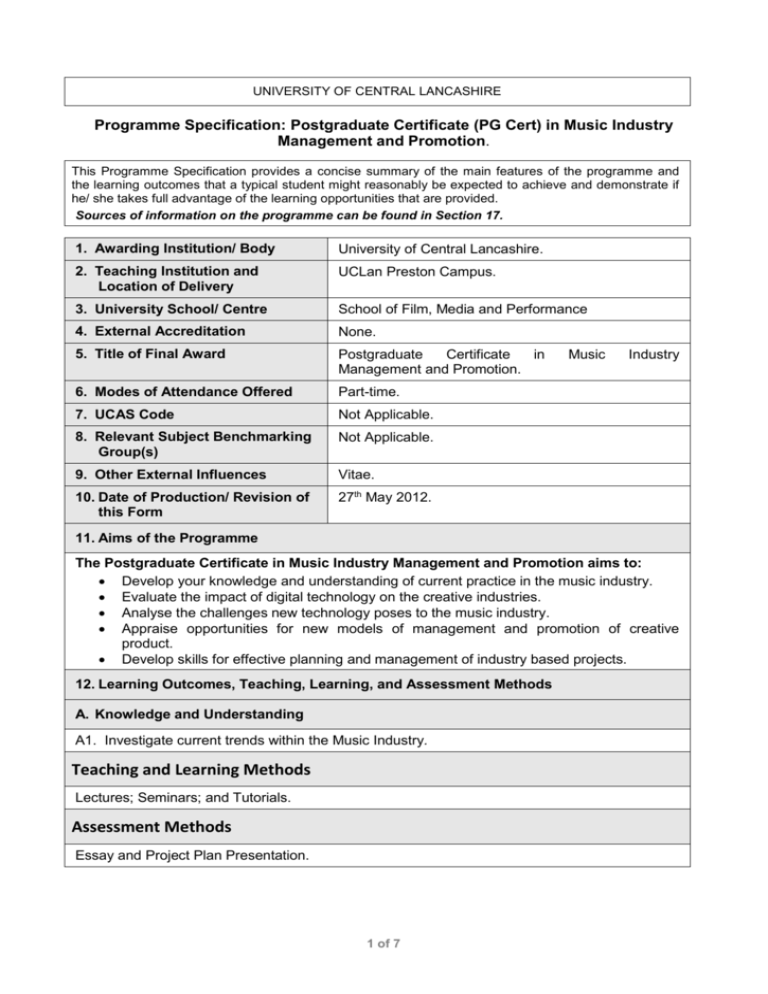
UNIVERSITY OF CENTRAL LANCASHIRE Programme Specification: Postgraduate Certificate (PG Cert) in Music Industry Management and Promotion. This Programme Specification provides a concise summary of the main features of the programme and the learning outcomes that a typical student might reasonably be expected to achieve and demonstrate if he/ she takes full advantage of the learning opportunities that are provided. Sources of information on the programme can be found in Section 17. 1. Awarding Institution/ Body University of Central Lancashire. 2. Teaching Institution and Location of Delivery UCLan Preston Campus. 3. University School/ Centre School of Film, Media and Performance 4. External Accreditation None. 5. Title of Final Award Postgraduate Certificate in Management and Promotion. 6. Modes of Attendance Offered Part-time. 7. UCAS Code Not Applicable. 8. Relevant Subject Benchmarking Group(s) Not Applicable. 9. Other External Influences Vitae. 10. Date of Production/ Revision of this Form 27th May 2012. Music Industry 11. Aims of the Programme The Postgraduate Certificate in Music Industry Management and Promotion aims to: Develop your knowledge and understanding of current practice in the music industry. Evaluate the impact of digital technology on the creative industries. Analyse the challenges new technology poses to the music industry. Appraise opportunities for new models of management and promotion of creative product. Develop skills for effective planning and management of industry based projects. 12. Learning Outcomes, Teaching, Learning, and Assessment Methods A. Knowledge and Understanding A1. Investigate current trends within the Music Industry. Teaching and Learning Methods Lectures; Seminars; and Tutorials. Assessment Methods Essay and Project Plan Presentation. 1 of 7 B. Subject-Specific Skills B1. B2. B3. B4. B5. B6. Evaluate promotional strategies for music industry products and events. Evaluate and prepare musical material for public release or performance. Produce a project plan for the management and promotion of music product or event. Analyse the operation and management of a music industry structure. Apply contextual and specialist music industry knowledge to a professional project. Appraise music industry strategies for management and promotion. Teaching and Learning Methods Industrial Placement; Lectures; Seminars; and Tutorials. Assessment Methods Portfolio, Presentation, and Viva Voce; plus: Essay and Project Plan Presentation. C. Thinking Skills C1. Analyse the challenges and opportunities created by new technology. Teaching and Learning Methods Lectures; Seminars; and Tutorials. Assessment Methods Essay and Project Plan Presentation. D. Other Skills relevant to Employability and Personal Development D1. Work effectively as a member of a team within a music industry context. D2. Plan and deliver industry project outcomes to agreed deadlines. D3. Manage projects within agreed budgets. Teaching and Learning Methods Industrial Placement; Lectures; Seminars; and Tutorials. Assessment Methods Portfolio, Presentation, and Viva Voce; plus: Essay and Project Plan Presentation. 13. Programme Structures* 14. Level Module Code Module Title Level 7 MU4000(L7) Music Placement Industry 40 Level 7 MU4001(L7) Music Industry: Product and Audience 20 Awards and Credits* Credit Rating 2 of 7 The Postgraduate Certificate in Music Industry Management and Promotion requires 60 Credits at Level 7. 15. Personal Development Planning Each student is supported in the creation of a Primary Action Plan (PAP) that synthesises their key achievements/ experiences, knowledge, and skills, - and maps these against preferences for progression, personal development, and employment to focus the broadest personal context for long-term action planning. The Primary Action Plan is referred to at strategic planning points throughout the course to key the long-term action points into course focussed medium-term action points and module focussed short-term action points. That progressive process leads to refined focus in the completion of modular assignments that are directly keyed into each student’s personal development and employability goals for which evidence and further planning are collected in the form of a Personal Development Plan (PDP). Each student is supported in the completion of their PDP during formative assessments and after actual assessments to enrich learning, enhance reflective practice, self-assessment and professionalism, and to maximise employability. There are plenary sessions at the close of each module where reflective evaluation is emphasised and practiced through dialogue. Reflective practice is also facilitated through Action Learning Sets (ALS) specifically as proviso for self-reflection, peer learning, relational exchange and reflective dialogue, - and these ALS are maintained throughout the course. Each PDP contains the student’s personal rationale for undertaking this course; personal aspirations for progression/ employment; course-related expectations; plus mapping of the course learning outcomes against Strengths Weaknesses Opportunities and Threats (SWOT) analysis to identify personal learning requirements. As well as assisting students to own, manage, map, focus, monitor, and review their own learning experiences, the PDP assists the tutors in identifying and understanding each student’s particular learning preferences, expectations, and requirements; specific areas where additional support is required; plus specific strengths and weaknesses of the programme design and implementation. Each student’s PDP should be brought in to the Induction, the plenary sessions, the formative and actual assessments, and to group and individual tutorials in order that progress can be monitored and reviewed so that action plans can be devised particular to each student’s requirements. PDP include: contact details; Curriculum Vitae (CV); record of achievements; personal statement; SWOT analysis; reflective diary entries; ALS minutes; career advice; tutorial records and action plans; peer feedback, assessment reports; certificates; employment opportunities; employment contacts; employment application forms/ speculative letters; plus review and evaluation with pointers for Continuing Professional Development (CPD). PDP are used to plan, document, and administrate for progression and employment. All students make a first draft or update of their PDP during Induction and further developments are guided within modules and tutorials. 3 of 7 16. Admissions Criteria Programme Specifications include minimum entry requirements, including academic qualifications, together with appropriate experience and skills required for entry to study. These criteria may be expressed as a range rather than a specific grade. Amendments to entry requirements may have been made after these documents were published and you should consult the University’s website for the most up to date information. Students will be informed of their personal minimum entry criteria in their offer letter. Admission is by application for a postgraduate taught course plus interview (in exceptional circumstances, we offer telephone interviews). We accept applications up until July each year. Applicants are encouraged to provide a portfolio of work at interview with example(s) of the applicant’s art(s) practice(s). There are three key aspects to the interview: for applicants to gain deeper insight in to the course in order to make the best possible informed decision; for applicants to provide some insight into their practice(s) and course-related expectations; for the interviewer(s) to determine whether the applicant(s) would benefit from the course and probably achieve timely completion. The application procedure addresses prospective students’ strengths and requirements in respect of: professional and/ or experiential knowledge; practical skills; communication and interpersonal skills; plus academic ability. We prefer applicants to have achieved (the equivalent of) a first/ higher second-class Bachelor of Arts (BA Hons) degree. Applicants are welcome with qualifications in subjects across the arts and are required to demonstrate understanding of and commitment to creative practice. If applicants do not have the preferred entry qualifications, they will be considered with equivalent qualifications or if they can demonstrate how they will benefit from this course and achieve timely completion. International Applicants We welcome applications from international students and the application procedure previously described should be used. International applicants should also be able to demonstrate IELTS of at least 6.5. Forms and literature regarding study in the UK are available from the British Council Offices or British Embassies throughout the world. Applicants with Disabilities/ Learning Difficulties We welcome applications from students with disabilities/ learning difficulties and the application procedure previously described should be used. We recommend that applicants with disabilities/ learning difficulties contact us to discover the support we can offer – Telephone/ Text Phone: (+44) 01772 892593. Accreditation of Prior Learning Accreditation of Prior Certificated Learning (APCL) or Accreditation of Prior Experiential Learning (APEL) are not available for the Postgraduate Certificate in Music Industry Management and Promotion but can be claimed as contributors towards the Postgraduate Diploma in Music Industry Management and Promotion or the Master of Arts in Music Industry Management and Promotion. 4 of 7 17. Key Sources of Information about the Programme Course Leader: Les Gillon Telephone: (+44) 01772 893908 Email: lgillon@uclan.ac.uk. Office: University of Central Lancashire. Preston. Lancashire. PR1 2HE. UK. School of Art, Design and Performance. Media Factory ME224. Music Industry Management and Promotion Information Pack: available from the Course Leader. UCLan Web Site: www.uclan.ac.uk/information/courses/index.php. Postgraduate Prospectus: available from the Admissions’ Office or the School of Art, Design and Performance Office. Postgraduate Open Days, Applicant Days, and Campus Tours, facilitated periodically, ordinarily on Wednesdays or at Weekends by Advancement Services: Telephone: (+44) 01772 201201 or Book Online at: www.uclan.ac.uk/opendays. School of Art, Design and Performance Office: University of Central Lancashire. Preston. Lancashire. PR1 2HE. UK. School of Art, Design and Performance Office. Victoria Building: VB120-VB126. Telephone: (+44) 01772 893959. Email: janpcrane@uclan.ac.uk. Admissions’ Office: Enquiry Management at the University of Central Lancashire. Preston. Lancashire. PR1 2HE. UK. Foster Building. Telephone: (+44) 01772 892400. Fax: (+44) 01772 894959. Email: cenquiries@uclan.ac.uk. Marketing Services: Telephone: (+44) 01772 892700. Support for Applicants with Disabilities/ Learning Difficulties: Telephone/ Text Phone: (+44) 01772 892593 (please note: this is not a course specific resource). UCLan Student Union: www.uclansu.co.uk (please note: this is not a course specific resource). British Council's Website: www.educationuk.org (please note: this is not a course specific resource). Preston City Life: www.visitpreston.com (please note: this is not a course specific resource). Online Application Form: http://www.uclan.ac.uk/information/prospective_students/how_to_apply/postgraduate.php. 5 of 7 18. Curriculum Skills Map Please tick in the relevant boxes where individual Programme Learning Outcomes are being Assessed Programme Learning Outcomes Level Module Code Module Title Core (C), Compulsory (COMP), or Option (O) Knowledge and Understanding LEVEL 7 A1 MU4000(L7) Music Industry Placement Core (C) MU4001(L7) Music Industry: Product and Audience Core (C) B1 B2 B3 Thinking Skills Subject-Specific Skills B4 B5 B6 C1 Please Note: any mapping to other external frameworks (for example: professional/ statutory bodies) is included within the Student Handbook. 6 of 7 Other Skills relevant to Employability and Personal Development D1 D2 D3 7 of 7

